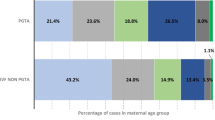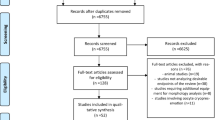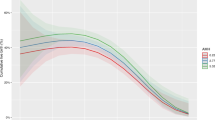Abstract
Purpose
To explore whether the presence of a Y chromosome AZFc microdeletion confers any adverse effect on the outcomes of intracytoplasmic sperm injection (ICSI) with fresh ejaculated sperm.
Methods
A total of 143 oligozoospermia patients with Y chromosome AZFc microdeletion in ICSI cycles in a five-year period were studied. Infertile men with normal Y chromosome in ICSI at the same time-frame were used as controls matched to the study group for age of female, female’s body mass index, male’s age, infertility duration and number of oocytes retrieved. Retrospective case–control study was used.
Results
There were no significant differences between groups in clinical outcomes of endometrial thickness, transferred embryos, good embryo rates, implantation rates, biochemical pregnancy rates, clinical pregnancy rates, ectopic pregnancy rates, miscarriage rates, preterm birth rates, the ratio of male and female babies, newborn body height, newborn weight, low birth weight and birth defects (P > 0.05). Patients with Y chromosome AZFc microdeletion had a lower fertilization rate (61.8 % vs. 67.8 %, P < 0.05) and higher cleaved embryo rate (94.0 % vs. 88.1 %, P < 0.05).
Conclusions
ICSI clinical outcomes for oligozoospermic patients with Y chromosome AZFc microdeletion are basically comparable to that of infertile patients with normal Y chromosomes. The results of ICSI were not affected by the AZFc deletion. Preimplantation genetic diagnosis (PGD) before ICSI for Y chromosome AZFc microdeletion may not be a justifiable regular procedure if the couples didn’t care the vertical transmission of Y chromosome deletion.

Similar content being viewed by others
References
Martin RH. Cytogenetic determinants of male fertility. Hum Reprod Update. 2008;14(4):379–90.
Foresta C, Moro E, Ferlin A. Prognostic value of Y deletion analysis. The role of current methods. Hum Reprod. 2001;16(8):1543–7.
Foresta C, Moro E, Ferlin A. Y chromosome microdeletions and alterations of spermatogenesis. Endocr Rev. 2001;22(2):226–39.
Choi JM, Chung P, Veeck L, Mielnik A, Palermo GD, Schlegel PN. AZF microdeletions of the Y chromosome and in vitro fertilization outcome. Fertil Steril. 2004;81(2):337–41.
Ma K, Sharkey A, Kirsch S, et al. Towards the molecular localisation of the AZF locus: mapping of microdeletions in azoospermic men within 14 subintervals of interval 6 of the human Y chromosome. Hum Mol Genet. 1992;1(1):29–33.
Reijo R, Lee TY, Salo P, et al. Diverse spermatogenic defects in humans caused by Y chromosome deletions encompassing a novel RNA-binding protein gene. Nat Genet. 1995;10(4):383–93.
Reijo R, Alagappan RK, Patrizio P, Page DC. Severe oligozoospermia resulting from deletions of azoospermia factor gene on Y chromosome. Lancet. 1996;347(9011):1290–3.
Vogt PH, Edelmann A, Kirsch S, et al. Human Y chromosome azoospermia factors (AZF) mapped to different subregions in Yq11. Hum Mol Genet. 1996;5(7):933–43.
van Golde RJ, Wetzels AM, de Graaf R, Tuerlings JH, Braat DD, Kremer JA. Decreased fertilization rate and embryo quality after ICSI in oligozoospermic menwith microdeletions in the azoospermia factor c region of the Y chromosome. Hum Reprod. 2001;16(2):289–92.
Kihaile PE, Kisanga RE, Aoki K, Kumasako Y, Misumi J, Utsunomiya T. Embryo outcome in Y-chromosome microdeleted infertile males after ICSI. Mol Reprod Dev. 2004;68(2):176–81.
Komori S, Kato H, Kobayashi S, Koyama K, Isojima S. Transmission of Y chromosomal microdeletions from father to son through intracytoplasmic sperm injection. J Hum Genet. 2002;47(9):465–8.
Stouffs K, Lissens W, Tournaye H, Van Steirteghem A, Liebaers I. The choice and outcome of the fertility treatment of 38 couples in whom the male partner has a Yq microdeletion. Hum Reprod. 2005;20(7):1887–96.
Ferlin A, Arredi B, Speltra E, et al. Molecular and clinical characterization of Y chromosome microdeletions in infertile men: a 10-year experience in Italy. J Clin Endocrinol Metab. 2007;92(3):762–70.
Wu W, Zhou ZM, Lin M, et al. [Y-chromosome microdeletions do not affect the outcomes of ICSI for infertile males]. Zhonghua Nan Ke Xue. 2011;17(9):771–4.
Fujisawa M, Shirakawa T, Kanzaki M, Okada H, Arakawa S, Kamidono S. Y-chromosome microdeletion and phenotype in cytogenetically normal men with idiopathic azoospermia. Fertil Steril. 2001;76(3):491–5.
Aknin-Seifer IE, Touraine RL, Lejeune H, et al. A simple, low cost and non-invasive method for screening Y-chromosome. Hum Reprod. 2003;18:257–61.
Simoni M, Bakker E, Krausz C. EAA/EMQN best practice guidelines for molecular diagnosis of y-chromosomal microdeletions. State of the art 2004. Int J Androl. 2004;27(4):240–9.
World Health Organization. Laboratory manual for the examination of human semen and sperm-cervical mucus interaction. 4th ed. New York: Cambridge University Press; 1999.
van der Ven K, Montag M, Peschka B, et al. Combined cytogenetic and Y chromosome microdeletion screening in males undergoing intracytoplasmic sperm injection. Mol Hum Reprod. 1997;3(8):699–704.
Foresta CFA, Garolla AME, Pistorello MBS, Rossato M. High frequency of well-defined Y-chromosome deletions in idiopathic Sertoli cell-only syndrome. Hum Reprod. 1998;13:302–7.
Van Landuyt L, Lissens W, Stouffs K, Tournaye H, Liebaers I, Van Steirteghem A. Validation of a simple Yq deletion screening programme in an ICSI candidate population. Mol Hum Reprod. 2000;6(4):291–7.
McLachlan RI, O’Bryan MK. Clinical review#: state of the art for genetic testing of infertile men. J Clin Endocrinol Metab. 2010;95(3):1013–24.
Halliday J. Outcomes for offspring of men having ICSI for male factor infertility. Asian J Androl. 2012;14(1):116–20.
Mansour RT, Aboulghar MA, Serour GI, et al. The effect of sperm parameters on the outcome of intracytoplasmic sperm injection. Fertil Steril. 1995;64:982–6.
Nagy ZP, Liu J, Joris H, et al. The result of intracytoplasmic sperm injection is not related to any of the three basic sperm parameters. Hum Reprod. 1995;10:1123–9.
Mulhall JP, Reijo R, Alagappan R, et al. Azoospermic men with deletion of the DAZ gene cluster are capable of completing spermatogenesis: fertilization, normal embryonic development and pregnancy occur when retrieved testicular spermatozoa are used for intracytoplasmic sperm injection. Hum Reprod. 1997;12(3):503–8.
Oates RD, Silber S, Brown LG, Page DC. Clinical characterization of 42 oligospermic or azoospermic men withmicrodeletion of the AZFc region of the Y chromosome, and of 18 childrenconceived via ICSI. Hum Reprod. 2002;17(11):2813–24.
Suganuma N, Asada Y, Yamamoto M, et al. Successful pregnancy after intracytoplasmic injection of a single testicular spermatozoon into a human oocyte: a case report. J Obstet Gynaecol Res. 1996;22(2):111–7.
Palermo GD, Schlegel PN, Hariprashad JJ, et al. Fertilization and pregnancy outcome with intracytoplasmic sperm injection for azoospermic men. Hum Reprod. 1999;14(3):741–8.
Shi YC, Cui YX, Wei L, et al. [AZF microdeletions on the Y chromosome in infertile Chinese men: a five-year retrospective analysis]. Zhonghua Nan Ke Xue. 2010;16(4):314–9.
Fu L, Ding XP, Shen MJ, Li C, Nie SS, Quan Q. [Screening and clinical phenotype analysis of microdeletions of azoospermia factor region on Y chromosome in 1011 infertile men]. Zhonghua Yi Xue Yi Chuan Xue Za Zhi. 2012;29(2):184–7.
Krausz C, Forti G. Sperm cryopreservation in male infertility due to genetic disorders. Cell Tissue Bank. 2006;7(2):105–12.
Patrat C, Bienvenu T, Janny L, et al. Clinical data and parenthood of 63 infertile and Y-microdeleted men. Fertil Steril. 2010;93(3):822–32.
Bellver J, Meseguer M, Muriel L, et al. Y chromosome microdeletions, sperm DNA fragmentation and sperm oxidative stress as causes of recurrent spontaneous abortion of unknown etiology. Hum Reprod. 2010;25(7):1713–21.
Mau C, Juul A, Main KM, Loft A. Children conceived after intracytoplasmic sperm injection (ICSI): is there a role for the paediatrician. Acta Paediatr. 2004;93(9):1238–44.
Funke S, Flach E, Kiss I, et al. Male reproductive tract abnormalities: more common after assisted reproduction. Early Hum Dev. 2010;86(9):547–50.
Lie RT, Lyngstadaas A, Orstavik KH, Bakketeig LS, Jacobsen G, Tanbo T. Birth defects in children conceived by ICSI compared with children conceived by other IVF-methods; a meta-analysis. Int J Epidemiol. 2005;34(3):696–701.
Page DC, Silber S, Brown LG. Men with infertility caused by AZFc deletion can produce sons by intracytoplasmic sperm injection, but are likely to transmit the deletion and infertility. Hum Reprod. 1999;14(7):1722–6.
Yu Y, Wu J, Fan Y, et al. Evaluation of blastomere biopsy using a mouse model indicates the potential high risk of neurodegenerative disorders in the offspring. Mol Cell Proteomics. 2009;8(7):1490–500.
Author information
Authors and Affiliations
Corresponding author
Additional information
Capsule The object of this study is to explore whether the presence of a Y chromosome AZFc microdeletion confers any adverse effect on the outcomes of intracytoplasmic sperm injection (ICSI). The results show that there is no difference in ICSI clinical outcomes between oligozoospermic patients with Y chromosome AZFc microdeletion and that with normal Y chromosomes.
Rights and permissions
About this article
Cite this article
Liu, Xh., Qiao, J., Li, R. et al. Y chromosome AZFc microdeletion may not affect the outcomes of ICSI for infertile males with fresh ejaculated sperm. J Assist Reprod Genet 30, 813–819 (2013). https://doi.org/10.1007/s10815-013-0009-y
Received:
Accepted:
Published:
Issue Date:
DOI: https://doi.org/10.1007/s10815-013-0009-y




